Don't wanna be here? Send us removal request.
Text
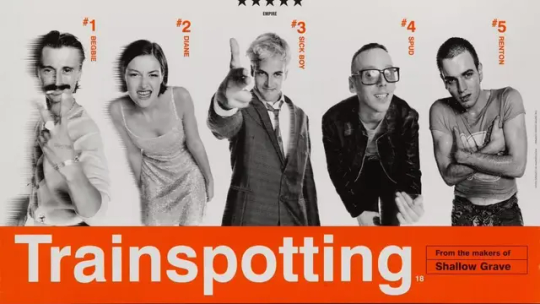
Was Mark Right to Screw up his Friends? - Thoughts About the Plot of Trainspotting
6.05.24 - Blog Post #11
Based on Irvine Welsh's novel of the same name, Trainspotting opens with Rent's Choose Life speech. Choose Life is the name given to the anti-drug campaign of 80s Britain. People from Eskişehir know that posters are hanging by the pharmacy door of Anadolu University saying “Say no to drugs, stay in life”. Choose life is similar to that. But what kind of life are junkies supposed to choose? According to Rent, a typical civil servant life: Dishwasher, car, mortgage, kids, 9-5 shifts, etc… While Rent lists these things, we see the characters for the first time, the part that interests me is how Tommy and Spud are introduced.
Introduction of the Guys
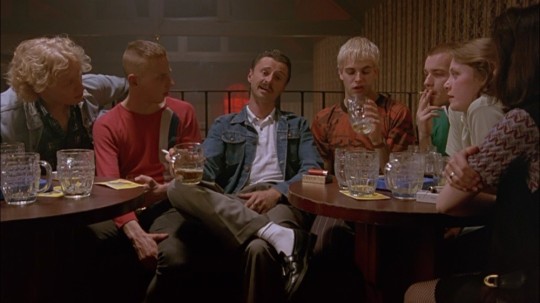
The Guys (from left to right): Tommy, Spud, Begbie, Sick Boy, Rent (Mark)
In the opening scene, our guys are on the field, Spud is in goal. Spud ship a goal from the other team, everybody gives him the "Oh My God" look, and Spud dances and takes the ball. I had the feeling that no one here had any respect for Spud. On the other hand, Tommy gets cornered by two opposing players and calls his friends for help, but no one helps him. When Tommy gets fucked up later in the movie and his so-called friends leave him alone, I felt like it was symbolized beforehand with that scene.
After telling us about the wonders of heroin, Rent says: "The worst thing about being an addict is that you have to listen to a bunch of shitty guys." Of course, Begbie is the shitty guy. First, we see Begbie in front of a pool table, downing his drink in one gulp while saying something like, "I would never put that chemical in my body." Later we see Tommy with his girlfriend Lizzy, he has her under his arm, he says he would never do drugs and takes a drag from his cigarette. Begbie is addicted to violence, fighting, adrenaline, alcohol, and cigarettes. (He made a mountain of empty cigarette packs in a few days while squatting in Rent's London flat). Tommy is addicted to Lizzy, and when she leaves him, he channels his addiction into something else, heroin. Also, Mark mentioned that his mother had a "socially acceptable" drug addiction - painkillers. All of these people have addictions that society approves of, but since heroin is illegal, they feel entitled to criticize another addict.
Mark's Relationship with His Friends
Throughout the movie we see Mark going back and forth between quitting heroin and leaving his friends, it's a vicious cycle. Rent reflects the psychology of an addict quite well, at least we don't see him say "I quit!!!" and then stop putting chemicals in his body (like in most movies). Or that after all sorts of dramatic events (all caused by the indifference caused by the drugs they use), everyone goes back to using heroin as if nothing happened. Everyone has a different opinion about the motivations or psychology of Rent. I have some ideas of my own.
Rent likes heroin, he likes the fellas. This environment, this dump, has been his comfort zone for years. No one thinks they are doing anything bad, they steal to get drugs, they cheat doctors, they pocket their parents' stash, they live in garbage houses and they have no sex life. Rent knows there is another life, but he despises that life, and at the same time he cannot see the way forward with this group of friends and this lifestyle. As the movie progresses, especially in the second half, Rent begins to despise and resent his friends and their choices, as if a voice in his head keeps saying, "What are you doing here, get out." But Rent is not only addicted to heroin, but also to his friends. He doesn't know what will fill the void when he leaves them. Even when he goes to London, the ghosts of his old life haunt him, Sick Boy and Begbie come and invade his apartment. Even when he returns for Tommy's funeral, he finds himself working as a drug dealer. His "friends" eat his food, sell his stuff, pull knives on him, go through his bank accounts, inspect his stuff even though they know it's clean, the list goes on and on. The more he gets rid of his addiction to rent, the more he sees these people in a different light: losers who will never change, who will do anything for drugs. Mark realizes that what they have in common is not the same mindset or the same interests, and that the only thing that holds them together is that they are all addicts.
But Mark is also no saint.
After he steals the sex tape of Tommy and his girlfriend, he knows this is the reason they broke up but he never reveals it, even when he is "clean" he does Tommy no favors other than giving him money when he knows Tommy is in a bad mindset - if that can be called a favor - he does not visit Spud when he is in jail, even when Dawn dies he tries to get high before the baby's mother does; the list goes on and on. In the last scene of the movie he says, "The truth is, I'm a bad person, but that's going to change, I'm going to change."
So was Mark right to fuck those people?
I think the group splits into two: Tommy and Spud and Begbie and Sick Boy. Begbie and Sick Boy deserved whatever they got. That's what Rent says anyway. Sick Boy is a manipulative asshole who can pull himself out of the hole he fell into, and he is of no use to Rent. Begbie is even worst. He is aggressive towards Rent, you can say he's aggressive towards everyone, but he despises Rent, Rent is just a dirty junkie in his eyes. The reason Rent can't get Begbie out of his life is not because he sees him as a friend, it's because he's terrified of him. I think Mark's sympathy for Spud comes entirely from pity. He's the naive Spud who can't get anything done, who nods his head at whatever anyone says. Mark is protective of Spud despite his selfishness, but when the going gets tough, he's just playing along because it's obvious that Spud's not going to be able to do shit. In the hotel scene, we discussed with friends the last look and wait for Spud before Rent swipes the money, some said that Rent was waiting at the door to convince Spud to “come and run away with me”, some said that Spud's last nod was not a “can't come” but a “look Begbie will fuck us both, don't do it, we'll get burned” gesture. I think Rent realized in the bar scene before the finale that Spud is vulnerable and can't break away from his friendships. When Rent says what he would do with the money, Spud didn't say anything about breaking away from Edinburgh or his friends also he didn't take Mark seriously in the scene where he pointed to the money. In the same scene when Spud tries to stop Begbie, his hand got cut but no one helps him- The bar scene is definitely the scene where Mark's strings broke.
Mark knew that Sick Boy would somehow steal the money if he didn't take it. Also, Begbie would probably threaten everyone and get more money for himself. But what about what he did to Tommy?
Mark had indirectly caused Tommy and his girlfriend to break up, and he doesn't reveal that he was the one who got the sex tape so it is basicly Mark's fault that they broke up. Let's say that he couldn't tell the truth because what he did was so shameful, but he could have been a good friend and would try to stay by Tommy's side. But what did he do?
Tommy was upset because he broke up with his girlfriend, and Mark, supposed to be Tommy's friend, gave the boy heroin without blinking an eye because he got the money - let's say he did it because he needed the money. Then later on he saw the state of Tommy's apartment, the state of his clothes, his lack of money, and gave him money, not helping him to get clean from heroin- And here, too, me and my friends had different opinions about this "favor" that Mark did by giving Tommy cash. While I thought Rent's smile was mean, others didn't think so. Let me explain why I think so. My first impressions of Tommy were the following (I'll cross out the ones that Mark doesn't have): He is handsome, he has a girlfriend(x), he has a regular sex life(x), he plays sports(x), he has a nice apartment(x), his parents obviously send him money(x), his only habit is smoking(x), he is confident, etc. etc.
Mark didn't really like Tommy.
I think Mark harbors an inner resentment against those who follow a path other than the junkie life. The choose life speech at the beginning of the movie is almost indistinguishable from the choose life speech at the end - Rent is about to choose a new life and yet he can still talk about this life in a hateful tone. That's why I think he's also full of resentment towards Tommy - that's why we never see him trying to help or regretting it, even though he indirectly arranges Tommy's end. He's upset when he sees Tommy and his apartment in that state, but when he gives Tommy money, he smiles, and it's not a comforting smile, it's a “You thought you were shit, you thought you were better than me, look, the tables have turned” kind of grin. Or, In some other scene, the guys had gone somewhere out of civilization, by train. There Tommy just says, “It's nice out, let's go for a walk, aren't you proud to be Scottish”, he's just trying to encourage his friends to go for a walk. Its all for nothing tho. After all, people who can only release hormones through chemicals are not going to want a natural antidepressant like walking. Rent screams at Tommy out of blue, because he cannot stand him being happy or hopeful. I think Rent is in wrong when it comes to Tommy, but no one else deserved any sympathy in that friend group.
To sum up, Rent's main problem was that he had an addictive personality, which made him lazy, unreliable, and addicted to his friends. When he eventually had a chance to break his chains from addiction, he was also able to cut his friends immediately, but I don't think we can blame him for it.
Trainspotting is still the best film about addiction and bad friends, who make you worse, not better. These type of friendships can be even deadly when you are young and naive. Stay away from people like Sick Boy for example... (or Mark, they are all evil.)
BONUS: That Epic Choose Life Speech

1 note
·
View note
Text

Antichrist: The Most Honest Film About Mental Ilness, Grief and "Nature" of Women
3.05.24 - Blog Post #10
Antichrist, the film Lars von Trier made when he was diagnosed with severe depression and dedicated to Andrei Tarkovsky, was booed at the Cannes Film Festival and Trier was declared a misogynist. When I think about how the film, which is about a couple whose children have died and who go to a country house to grieve, managed to become one of the most unpopular films by Trier, who always portrays female characters in his films, I realize that the film is completely misunderstood. In 2009, before the current social media lynching culture was born, Trier was right to make this risky film, because today, cinephiles fed on films like Barbie or Poor Things under the guise of "feminist film" would probably crucify Trier. So why is this film so disturbing and offensive to feminists?
Antichrist, the evil brother of Solaris and Andrei Rublev, has a seemingly simple story. The movie was promoted as a horror movie before its release, and it already contains a lot of horror elements. The audience who went to the cinema, expecting a horror movie, must have been slapped left and right and realized that the film was more than a horror movie: just as Rublev was more than a historical drama or Solaris more than a science fiction film. Based on the horror movie cliché of going to a cabin in a deserted forest, the film opens with perhaps the best and most ambitious sequence in the history of cinema: Unnamed He and She, father and mother, are making love when their young son Nick, who managed to get out of his crib, falls through an open window. She is hospitalized after the death of his son and tries to recover with medication. Her husband is a psychologist. The man, who thinks that psychiatrists put his wife to drugs and argues that the grieving process should be overcome in a natural way without medication, takes her out of the hospital despite her objections. After leaving the hospital, the woman suffers from anxiety attacks, and she self-harms and feels fear and terror of unexplained origin. Realizing that she fears a forest called Eden, her husband forces her to go to Eden and face her fears.
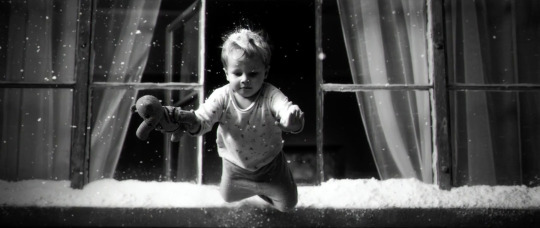
Their son, Nick - Still from Antichrist, dir. Lars von Trier, 2009
As he tries to persuade her to leave the hospital, she says to him, “Yes, you are very smart, you must be smarter than a doctor, of course you know best.” She lashes out in a spiteful voice. In the movie, he completely suspends his own grieving process and takes on the role of her savior, completely disregarding her own wishes and feelings. The therapy he wants to do is all about the confrontation of fear and uncovering her subconscious, very Freudian. The treatment and attitude that the man confidently tries to apply, which will end in disaster, is a phenomenon that women in the medical world have had to face for years. The woman, who is in a state of mind that Freud would call hysterical, is going through an atypical grieving process. Before her hospitalization, the woman we see at her son's funeral is quite expressionless, then she faints and and is hospitalized. At home, she has anxiety attacks and harms herself. Although these are behaviors that can be seen in the grieving process, they are not common. The arrogant man, unwilling to accept that the woman needs medical help and that this is beyond him, rejects modern medicine and asks her to flush her antidepressants down the toilet. Although he is portrayed as the kind, self-sacrificing and thoughtful husband who tries to help her, he actually represents the masculine order that does not listen to women struggling with mental illness and difficulties, considering them “hysterical” and “abnormal”. The audience, who does not see these points, thinks that the man is portrayed as “good” and “smart” and declares Trier a misogynist. In fact, the situation is quite the opposite.
The evil things the man does under the name of helping the woman are countless. Taking the woman to a completely different environment when she was already at the beginning of the grieving process, tearing her away from her routine and taking away her medication support, the man then takes her to a deserted forest where she will only be alone with her own subconscious and pain. The fact that she faints at the funeral shows that she is unable to face anything, that her brain has shut down. If our brain is trying to make us forget something and focus on other things, it means that we are not in a position to handle the situation. Throwing a person into the lap of something they are not ready for does nothing but teach them harmful coping mechanisms, or drive them mad. This is where the arrogant and overconfident husband misses the point. Not every prescription fits every situation. Before they go to the forest, as they travel on the train, he asks her to close her eyes and imagine she is in the forest. We see the woman crossing a bridge in Eden. This bridge actually represents the transition from consciousness to the subconscious: Whatever binds her to reality is now left behind, Eden, nature, will now control her.
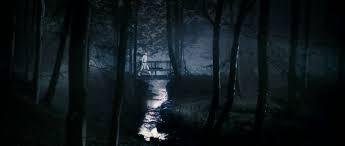
She crosses the bridge - Still from Antichrist dir. Lars von Trier, 2009
The most important point emphasized by feminists attacking the film is Trier's allegory of Woman-Nature-Evil-Devil. The woman, who is equated with nature, is shown as the enemy of reason, that is, of man and civilization, but this is not the focus. When they go to Eden, for example, the man keeps seeing "abnormalities" in nature: The shells sticking to his hands, the fox eating itself, the deer carrying the dead body of its half-born fawn remind us that everything we consider abnormal comes from nature. The fact that nature is described as horrible and cruel in the movie is actually the result of Trier's state of mind at the time, not because he wanted to vilify women. Suffering from severe depression, unable to control his own body, having panic attacks and depressive episodes, Trier wrote the script for Antichrist while taking heavy doses of Prozac. Because he was in major depression, everything seemed bad and meaningless, and Trier reflected his painful state of mind in the movie. In the film, Trier actually shows the helplessness of human beings in the face of mental illness and grief, because there is still no explanation for most cases of depression and mental illnesses other than childhood traumas - the more the rational side of the human being tries to find a reason for the situation, the more unmanageable the situation becomes. Some depressions really do come out of the blue and leave you helpless, and so does anxiety. In the movie, both men and women are helpless, nature is bad, harsh, and human beings, as a reflection of nature, suffer pain that they cannot help. I think the fact that this is analyzed through the woman in the movie is not an insult to the woman, it shows that her situation is even more difficult than men. The woman in the film was probably suffering from postpartum depression for years and unfortunately nobody realized it, not even her husband, the big-nosed psychologist.

Still from Antichrist dir. Lars von Trier, 2009
The movie parallels many of the teachings in the book Antichrist, from which it takes its title. In a chapter he adds at the end of the book, Nietzsche says: “Any transgression against nature is a sin. The most sinful man is the priest: he teaches transgression against nature. What is to be shown to the priest is not the reasons, but the asylum.” In the movie, the man is a priest, rejects modern medicine, separates the woman from her own nature, shames and punishes her for his instincts. He puts the woman at war with her own mind, with her own nature. Most mental illnesses are the result of fighting with one's own nature, which is in fact an animalistic. The people most oppressed and alienated from their nature by religion and social conventions are of course women, especially modern women. There is a flashback in the movie: The woman who wrote a thesis about women who were burned at the stake in the Middle Ages goes to Eden to complete her thesis, taking her young son with her. For some reason, her husband doesn't take care of the baby. The woman, who is supposed to be working, studying and being a great mother, slowly loses her mind and this loneliness goes unnoticed. The woman is afraid of being punished and at the same time carries a great guilt: In nature there are lions that eat their own cubs, cats that tear up yheir weak kittens, birds that throw chicks out of their nests - things that are unthinkable for humans. No matter what a woman does, she cannot exist: Even if she goes against her nature, even if she follows it, she is always doomed to feel guilty and incomplete. The fact that Trier reflects this in the movie doesn't mean that he shows women as hysterical maniacs, he just boldly shows those terrible impulses that no one wants to talk about.
The film not only offers different interpretations of mental illness, postpartum depression and atypical grief, but also focuses on religion-it is a great criticism of religion which is used to restrain society. We also see man's fight with his own nature, also the helplessness of human beings in the face of nature. The conflict between the logical side of us and the things that we cannot control: Our instincts, sexual desires, mental illnesses and aggression. Just like Solaris, Antichrist has a special place in my heart because, by disguising itself as another genre, it actually depicts the process of mourning and the guilt over a death and the most importantly, man's constant struggle with his own psyche. Also when it comes to the feminist backlash, contrary to the blinkered folks at Cannes, I see this movie as a criticism of men who put women in this grotesque state and then try to destroy or restrain them by burning them, destroying them, drugging them.
Because of the feminist backlash, I had to read the movie in terms of gender. May God protect Trier who gave us this masterpiece, from angry cinephile feminists. I hope in one day, we will become a society which is not this angry about the different depictions of the human condition in cinema.
8 notes
·
View notes
Text
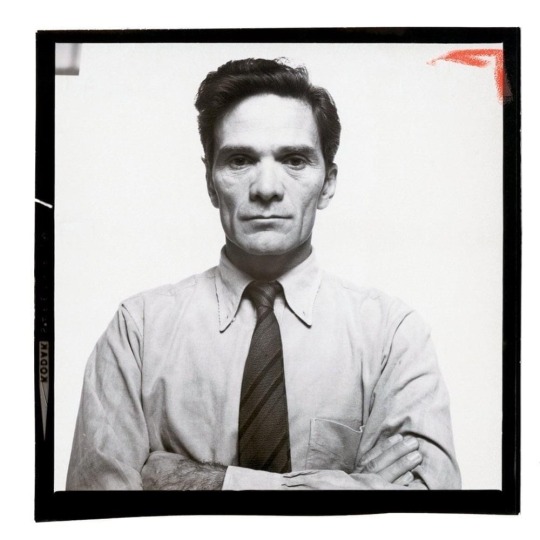
Pier Paolo Pasolini photographed by Richard Avedon, New York, September 24, 1966
Pier Paolo Pasolini: His Films and His Death
27.04.24 - Blog Post #9
Pier Paolo Pasolini was a famous writer, film director and poet. Known for his films that criticized capitalism, the fascist government of the time, and depicted ancient European culture and myths, Pasolini was 53 years old when he was brutally murdered in Rome on November 2, 1975, and had just finished shooting his last film, Salo, which would be considered his masterpiece. Pasolini's body was found on the side of the road, badly beaten, repeatedly run over by a car, and set on fire before he died. The next day, a 17-year-old boy who had been caught speeding in Pasolini's car went to jail and claimed to have committed the murder. The press claimed that Pasolini had tried to seduce the boy because he was gay, so the boy attacked Pasolini to protect his honor. In 2005, the "killer", now an old man, spoke to the press and said that a group of five men had committed the murder and that there were others behind them. After this statement, it was almost certain that the government of the time had murdered Pasolini, who had always had problems with the government and criticized its policies in his films. So what had Pasolini done to deserve such a painful and horrible death, and what was the Italian government trying to show the public by killing him?
Pasolini's confrontation with the fascist government began when he was studying dialectics at university: Pasolini, who entered university in 1939 as the world was drifting into a new war, had this to say about the government that was terrorizing the public at the time:
"Fascism did not tolerate dialect, the symbols of the irrational unity of the country of my birth."
The use of dialect was also an act of breaking the hegemony of the church over the underdeveloped masses. Throughout his career, he began his criticism of the church and the fascist government for oppressing the working class, which he saw as the true representative of deep-rooted Italian culture, by writing for magazines. The Second World War was very difficult for him and the letters he wrote until his conscription in 1943 are enough to understand his state of mind:
"My health is good, not bad, good, everything is good. And morally, when everything is calm, which is rarely, that's good too. But other than that I'm very afraid, afraid of losing my life. Do you understand, Rico? Not only mine, but everyone else's too. We've all been so fated, poor naked human beings! I don't know if we'll ever see each other again. Everything smells of death and end and guns. It's disgusting to see these types fucking up the world. I'd like to spit on the earth, with yellow and sky-blue flowers and jewels on the branches, while the leaves spew green shoots."
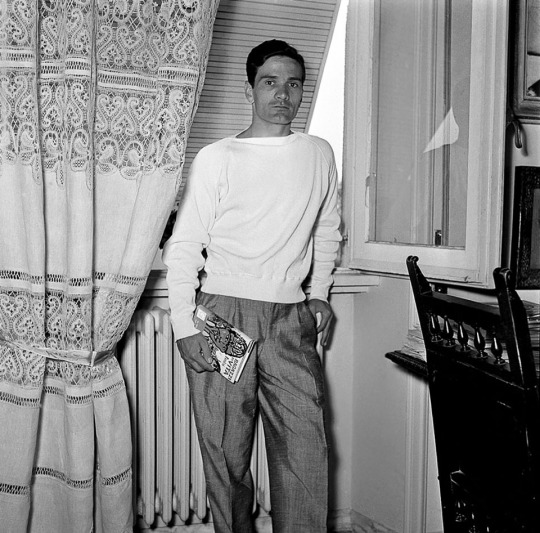
Pier Paolo Pasolini, Young Portrait, Sixties. Photographer: Unknown
The day after his conscription, Pasolini escaped during a scuffle with the Germans and, after wandering for a while in the Italian countryside, returned to the family home, where he began teaching. His brother Guido gave up hiding and joined the partisans. For two years Pasolini supported him financially and received letters from him describing the conflicts between the anti-fascist groups and what was happening during the war. In February 1945, Gudio survived a firing squad with a hundred other partisans and, wounded, walked to another village and took refuge in a woman's house. The soldiers took him out of that house, made him kneel in the snow against the wall and shot him. It was only after the war was over that Pasolini learned what had happened to his brother. He wrote these lines to a friend: "Sometimes I think of that road between Musi and Porzus, how my brother walked that road. My imagination becomes clear like an inexplicable white snowflake, like the brightness of the sky."
After the death of his brother and the end of the war, he returned to the university and after finishing his studies he worked as a teacher. He became close to the Italian Communist Party. His family blamed the communists for Guido's death, but Pasolini remained close to the party in order to resist the fascist government of the time. Because of his closeness to the party and the death of his brother as a partisan, his writings were harshly criticized by the right-wing press and he was blackmailed by powerful men of the Right to leave Rome. The worst of these blackmails was that he was accused of molesting three young children and was prosecuted in the press, although neither the children nor their parents ever pressed charges. Pasolini, who did not hide the fact that he was gay, was accused of pedophilia, which the right-wing press equated with homosexuality. Even after the cases were dropped and he was proven innocent, Pasolini, his reputation ruined, could no longer continue writing and lecturing and moved to the outskirts of Rome. As a gay and educated man, the difficult years he lived here would leave damage on his psychology, but it was also during these years that he had the chance to closely observe the working class that would be the subject of his films.
In 1953, Pasolini published his first book and was again subjected to insults and slander by the right-wing press. Accepting that his leftist acquaintances would not back him up and would not rescue him from the slums of Rome, Pasolini took a job as an art director on a low-budget film and began to expand his circle. He wrote the dialog for Fellini's La Dolce Vita, of which he was a great admirer, and opportunities began to present themselves for him to make his first film. Pasolini's first film as director and screenwriter was Accattone in 1961, again set among Rome's marginal communities, a story of pimps, prostitutes, and thieves that contrasted with Italy's postwar economic recovery.
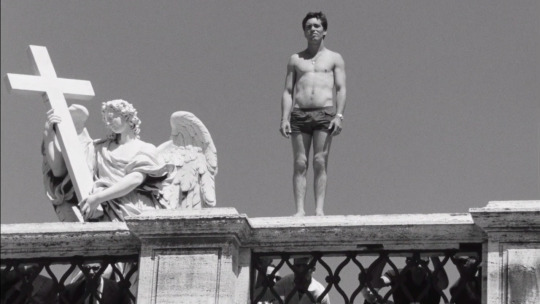
Stills from Accattone, dir. Pier Paolo Pasolini (1961)
Teorema, based on his own book, maybe the first film to understand Pasolini's cinematic style: Surreal and allegorical, it tells the story of a typical bourgeois Italian family who are seduced one by one by a handsome stranger who comes to their home. The film makes almost no sense if one is not aware of Pasolini and the political climate of his time, when in fact the bourgeois family that is seduced is portrayed as hypocritical, perverted and twisted, capable of abandoning their values for the sake of pleasure. The only person in the film who truly feels guilty and punishes herself for what she has done is the maid, and she is the only character who achieves sanctity at the end of the film. Pasolini, who was constantly ridiculed for being gay and treated as a pervert, made fun of the right-wing by making the son of the family's father gay: The stranger and the son of the house look together at Francis Bacon's paintings of violence and homosexual intercourse, and the bourgeois boy, who has nothing to do in the midst of his material freedom and privilege, resents life by making worthless paintings after being abandoned by the stranger.
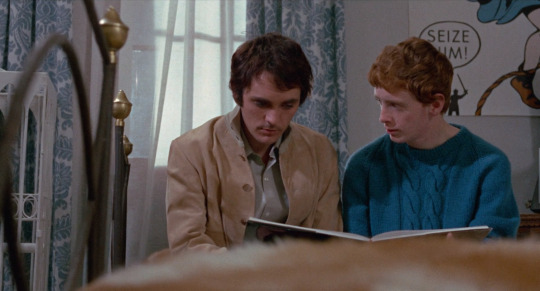
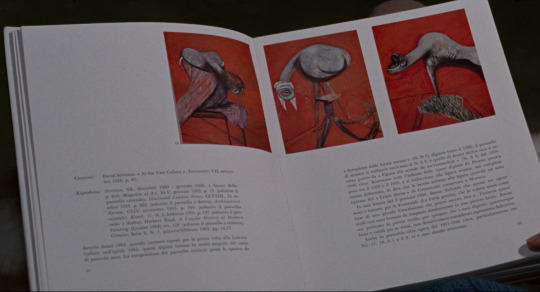
Stills from Teorema, dir. P.P. Pasolini (1968)
The mother of the house is seduced by a strange man who comes to the house. Far from regretting it, she seeks more pleasure and seduces a very poor young man and has sex with him in a hotel room. The mother's young daughter, who had been raised like a princess, also has sex with the stranger, and realizing that she can no longer be a bride for a rich bourgeois family because she is no longer a virgin, she stops eating and drinking and becomes mute.
Pasolini took revenge on the right-wing, who had been calling him perverted and immoral for years, and mocked them to such an extent that the film was banned by the government and Pasolini was declared an enemy of the people because he was able to attribute such perversions to the Italian families, the smallest unit of Fascist Italy. The book was confiscated from everywhere. Pasolini, now a world-renowned director, would continue to make films with support from abroad.
Although Pasolini came from a religious family and identified himself as a Catholic, he did not hesitate to criticize the church, which was closely linked to the fascist government. His film about Jesus Christ, The Gospel According to Matthew (1964), was criticized by the Church and the government. Pasolini, who had grown close to Italy's lower class, the working class, during his years living on the outskirts of Rome, believed that the most important reason why these people fell for the government's propaganda was the support of the Church. In fact, the fascist government, which cared neither for religion nor for traditional values, was able to bring the people to the consistency it wanted with the pressure of the church, which was flooded with money. Pasolini, who criticized capitalism as well as fascism, thought that the government and the Western world, in order to control the people, had separated them from their traditional values and turned them into empty customers. Pasolini was disgusted by the bourgeoisie riding on the backs of the lower class, the lower class which was confused about what to do with the empty words of the church, government propaganda and post-war poverty, and after Teorema he literally declared war on bourgeoisie.

The Gospel According to Matthew, dir. P.P. Pasolini (1964)
Porcile, my favorite Pasolini film, is based on two stories. In the first story, Julian, the son of a German factory owner, is unable to get out of bed for some unknown reason. His father's rival, Mr. Herdhitze, who has a Nazi past, seeks to blackmail the factory owner by using a trait of Julian's that is known to everyone but ignored by his family. In the other story, a young man living in an isolated mountain far away from people cannot resist the urge to kill people and eat their flesh, and becomes the head of a cannibalistic tribe. The film portrays the only son of a bourgeois family, supported by the state and the establishment, who is constantly committing crimes against humanity, as a rapist who breaks into peasants' pigsties and has sex with the pigs. Julian, who is promised to the daughter of another rich family, tries all sorts of ways to escape from her, falls into bed because of his repressed urges, and finally starts having sex with the peasants' pigs in order to suppress his sexual desires, which are against the world order. Julian, who should be punished for his inhuman behavior, is protected by his father's bourgeois position and the villagers are forced to keep quiet about the matter. In the end, Julian is torn apart and eaten alive by angry pigs. The wild impulses that humans have given up for protection and order cannot be controlled by the state and are punished by nature itself. Julian, an abnormality of nature, becomes the victim of his own victims.
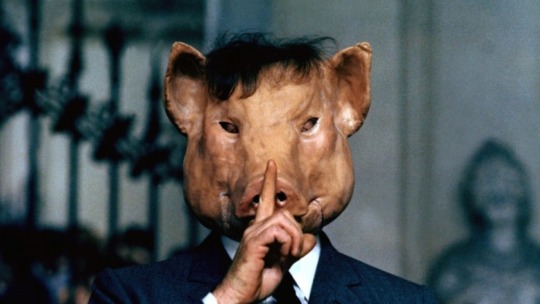
Still from Porcile, dir. P.P. Pasolini (1969)
The other story is about a young man who has fled civilization: Like Julian, he harbors forbidden urges, but without the connections and money to protect him from the wrath of society, he seeks refuge on Mount Etna. Killing and eating the people he finds in poverty and hunger, he eventually gathers people like himself and forms a tribe on the mountain. He is eventually captured by the inhabitants of a nearby village and executed by the forces of civilization. Pasolini's use of two stories so different in both texture and time actually strengthens the impact of the movie: The scene transitions are so sharp that you realize you are watching a movie all the time. Julian and his fiancée talk theatrically and play games non-stop; the man who comes to blackmail Julian's father is a fake Hitler. In the bourgeois world everything is fake, a game, and stupid. The scenerio and how people behave are so stupid that you might think Pasolini is mocking your intelligence, but in fact he is mocking the bourgeoisie. Setting Mount Etna, an uncanny mountain without a trace of civilization, in front of the magnificent estate of the bourgeois family, Pasolini gives us a realism that chills you to the bone, thanks to Pierre Clementi's wonderful acting. The young man, who is unclear why he killed his father, eats human flesh and society comes to punish him, even if it is done out of sight. While Julian commits a direct crime against nature, the cannibal young man commits a crime against the rules of society and the church. Or so it is shown. Pasolini makes us question what it means to be human, what is a crime and what is not, where man's betrayal of nature should be taken seriously, where nature itself does what the state or the order cannot do (no matter how much the white man opposes and outsmarts nature, in this order the outlier is somehow eliminated). He states that the Italians were slaves of the Germans during and before the war, and that the fascists and bourgeois who think homosexuality and sexual freedom are perversions are the real perverts and are protected from the punishment that they deserve.

Pierre Clementi as the cannibal, in Porcile dir. P. P. Pasolini (1969)
Pasolini's last film was the last straw for the Fascist government he had mocked. Pasolini, who liked to touch on subjects that disgusted and sensitized people, adapted the book of Marquies de Sade, known as the father of sadism, for the cinema. Moving the story to the fascist Italy of the 1940s, Pasolini made what is still the most controversial and difficult to watch movie of all time. Set in Salo, a puppet government in Northern Italy during World War II, four of the city's leading fascists kidnap eighteen adolescents, nine girls and nine boys, and imprison them in a castle. Sexual abuse, physical and mental torture will continue for 120 days.
In the movie, young boys and girls who are hunted like partridges trying to escape in the countryside are subjected to various tortures by four rich and powerful politicians. Apart from the torturers and the tortured, there is also an old prostitute in the castle: She, like the captured youngsters, was once tortured and raped. She has been convinced that what she is going through is normal and has become a puppet of the bourgeois men. Sipping wine and powdering her face while the young men and women are being tortured, she acts as a bridge between the audience and the characters in the movie: She becomes a mirror for us, the audience, who have chosen to side with the evil and the powerful, or who have been brainwashed, who have learned to enjoy rape, who have been lulled to sleep with food, makeup, beautiful music and art. Thanks to this woman, one feels ashamed of oneself. Even though she does not physically take part in the rapes and tortures, she is as despicable as the torturers because she is only a spectator, just like us, the spectators. While so many terrible things are happening in the world, we, who are distracted by our toys given to us by capitalism and block our ears, squirm and writhe trying to watch Salo, because someone on the screen is just like us and we can neither call her good nor bad. In this way, Pasolini brings out our ego, which is normally suppressed when we watch movies. This, rather than the nudity and violence, is what makes Salo the most difficult movie of all time to watch.
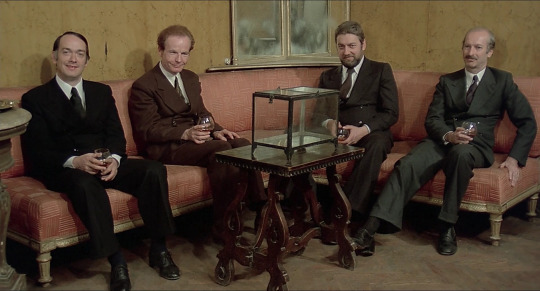
Still from Salo or 120 Days of Sadom dir. P. P. Pasolini (1975)
In the film, Pasolini portrays the fascists as sadists. Everything they accuse "enemies of the people" and "communists" of doing, these four men do in excess. All four are pedophiles, and homosexuals (both passively and actively), they have no faith in God, no morals, no shame, no compassion. While Pasolini was targeted for years for being gay, in Salo he chooses to show directly that clergy and politicians are also gay, and many of them are pedophiles. These men, respectable and powerful on the outside, are isolated in their mansions, having sex with peasant girls and peasant boys, bending over them for the sake of fantasy and rolling on the floor like dogs. With Salo, the events are no longer allegory, but direct accusation. In one scene, these men who keep the prisoners on a leash, marry boys to boys and girls to girls, serve them shit on golden plates. Perhaps the most famous scene of Salo is like the summary of Pasolini's career: "Capitalism gives you shit on a golden plate."
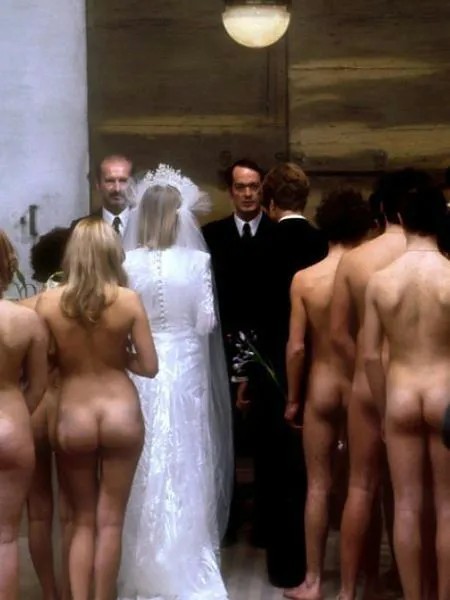
Still from Salo or 120 Days of Sadom dir. P. P. Pasolini (1975)
Pasolini, who was murdered only a few weeks after the film's shooting, but whose death was covered up because he was gay and dissident, accused of pedophilia, was also trying to keep forgotten European myths and stories alive with his films Decameron and Arabian Nights to ensure that oppressed and alienated people did not forget their past. Attacking both the fascist and capitalist government from every possible angle, Pasolini is, in my opinion, the only director who completely succeeded in using cinema as a powerful weapon, as Walter Benjamin suggested. Almost fifty years after his death, it is good to know that a man once fought with everything he had against the political oppression and capitalism that surrounds us now. Long live Pasolini!
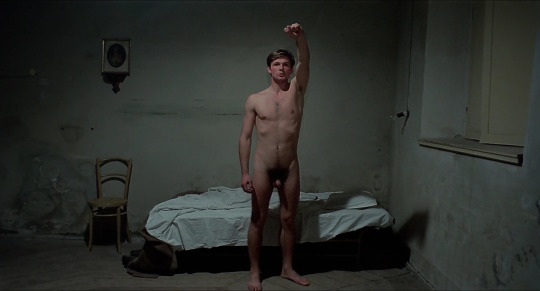
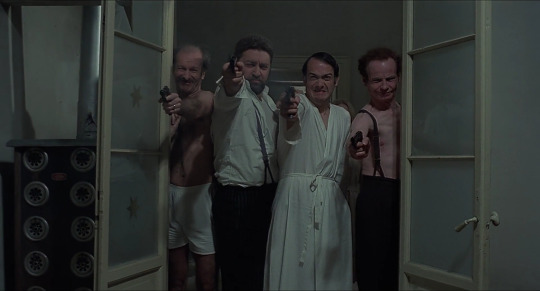
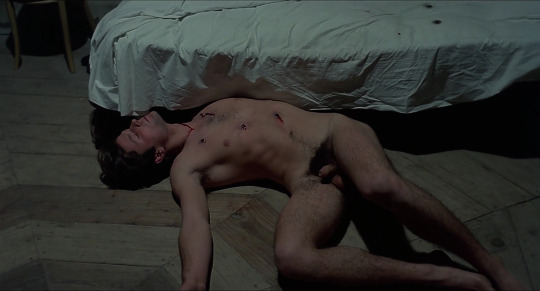
Still from Salo or 120 Days of Sadom dir. P. P. Pasolini (1975)
2 notes
·
View notes
Text
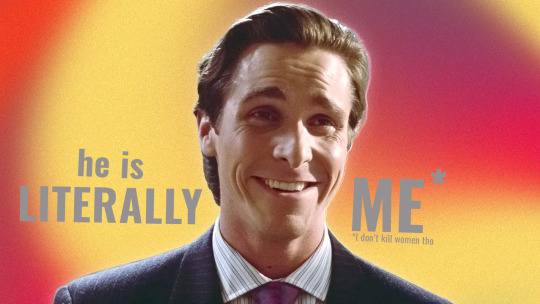
He is Literally You: American Psycho's Patrick Bateman and Gen Z Sigmas' Obsession of Him
Blog Post #8 - 21.04.24
We all know the movie - set in 1980s New York City, the movie tells the double life of Patrick Bateman, a wealthy businessman. Working on Wall Street, with a nice apartment, surroundings and opportunities, Patrick appears to be a friendly and sensitive citizen during the day, but at night he turns into a psychopath who tortures and kills people. The story is a very interesting take on the lives of young men in the modern age, and how the narrative can change the audience's overall opinion of a character, even if he is a sadistic asshole (and, a serial killer??). What I want to focus on is the latest obsession about the film, mostly focusing on Patrick, which has taken over Tiktok and Instagram: With the memes that are curated through the web, one can think that Patrick is like a role model or a mentor for adolescent boys and young adults who consider themselves ''sigmas.'' These sigmas see Patrick's actions and how he behaves around people as ''just'' and he is ''just like them.'' When you think about it, this sounds problematic. Patrick is an abuser, he is rude to everyone around him, he is obsessive and dangerous, he is a cheater and a killer - basically a pervert. But these things doesn't change the fact that Patrick is being a relatable character and sometimes he is literally ''us''.
The movie, which I watched when I was fourteen or fifteen and only the sex scenes and Patrick's skin care routine remained in my mind, kept falling in front of me thanks to the tiktokist Gen Z crew and the sigmas on Instagram. I think the fact that Patrick Bateman, who became the center of the "he is literally me" trend on social media, became a sadistic serial killer and idolized by young men is a subject that needs to be examined. When I came across the movie again, I tried to watch the movie by looking at Patrick through the eyes of Gen Z men. American Psycho is a decent movie with a very high tempo and a good gore setting, and even though it looks like a simple serial killer movie, it contains strong criticisms underneath. Through Patrick, we can see how the masculinity redefined by status, appearance and money is empty and toxic. Aimless in his comfort zone, with easy access to sexuality as a service that can be demanded, and frustrated by the smallest things because he has no tangible problems, Patrick cannot establish normal relationships with people because his environment is not normal either. In this world where everything is fake, marriage, having children, sex, eating, socializing, even women have become empty objects and things that can be bought with money. Sounds familiar, doesn't it? In such a world, Patrick, who has perverted sexual fantasies like Severine in Belle de Jour, starts daydreaming: It is unclear whether he kills people or not, and there is no point to it anyway. The unraveling of the movie is as meaningless as Patrick's life. That's why it's not strange that young people in the 21st century feel like Patrick, in a world where everything has already been done, where there is no great pain and no great happiness.
7 notes
·
View notes
Text
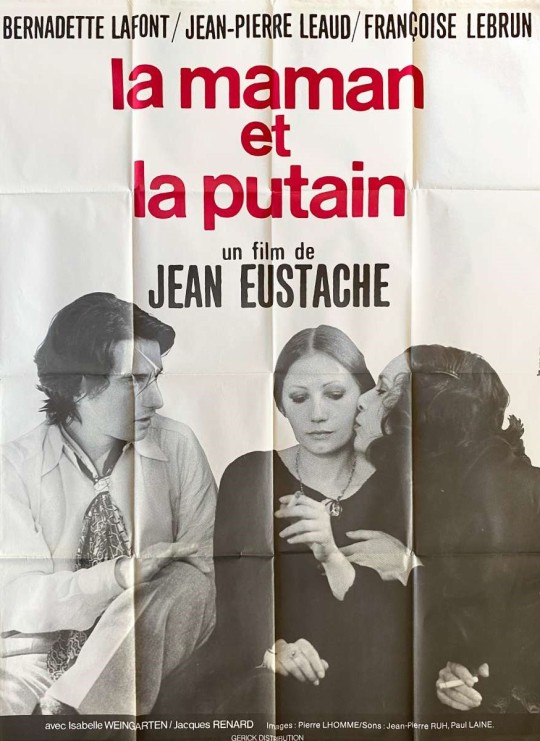
An Underrated Gem: Jean Eustache's The Mother and the Whore (1973), A Review of the Film and A Rant About the ''Man-child'' Trope in French Cinema
Blog Post #7
Youtube is a great place to watch old and long foreign films with subtitles, even if they are of the worst quality. In 2020, when we all had to stay at home, I was watching all the films I could find from La Nouvelle Vague, when all the films by Godard, Truffaut and Rohmer were finished, I came across a relatively unknown director whose name is Jean Eustache, best known for his film ''La Maman et la Putain''. The title of the film sounded wild to me, so I went for it, ignoring the quality and length. The film begins with a young man, Alexandre, who wakes up in a woman's bed and decides to declare his love to another woman. Alex is a dreamer, he likes to talk about politics, art and philosophy; he thinks he is a hopeless romantic and a naive man, maybe a bit lost in the modern world. But outwardly, Alex is an unemployed young man who is a burden to everyone he meets because he is open about his needs and is not ashamed to get a little 'help' from the women in his life. He lives with an older woman with whom he sometimes sleeps, and he is fine with the fact that this woman sometimes brings another man to have sex with, to the bed where Alexandre sleeps. Alex spends his life looking at girls on the streets of Paris or sitting in cafés chatting with his "enlightened" friend because he has nothing else to do. On the day he learns that his ex-lover, whom he wants to marry, is engaged, he meets Verinoka, an open-minded nurse, in a café. Alex is unfamiliar with Veronika's unconventional honesty, and she will shake the young man's views on sexuality and relationships.
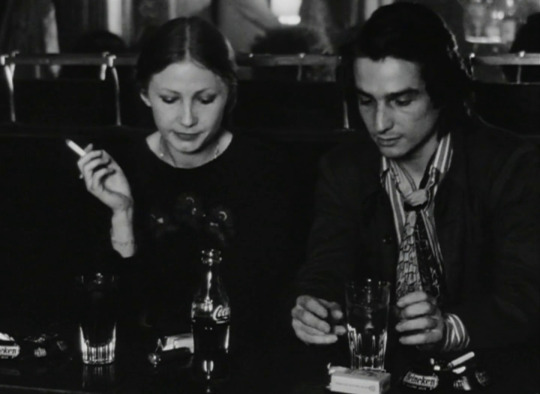
Veronika and Alexandre, La Maman et La Putain
The film is about disappointed youth after the events of '68, about bohemian life, about people who try to be nihilistic, but when confronted with real emotions they mess everything up and seem "reckless". The director wrote long monologues for Alexandre's character. The two women and we listen to Alexandre's ideas over and over again. Alex is an egoist, someone who, thanks to his devil's feather, is able to get out of situations in which he is helpless. He has a blunt attitude to relationships and women, thinking he knows everything. Because of his relaxed attitude, women had to play the "cool, uncaring" girl in their relationships with him. Whenever Marie, the character he lives with at home, gets frustrated, she shuts up and looks at her own life because of Alex's nonchalance, but underneath there is an undercurrent of ugliness and defiance. In fact, the film shows that people who appear to be very open do not express their true feelings and thoughts just to keep their image intact. While the character of Veronika at the beginning of the film presents the image of an uncaring woman who sleeps with everyone, who is not afraid to tell Alexandre that she desires him, who expresses her sexual desires, we see that she does not reveal a side of herself.
Her "putain" side is a defence mechanism against the men around her, it is the easiest way for her to communicate with them and live her sexuality, but she expects love, honesty (not indiscretion under this bohemian guise) and understanding from a relationship. She even expresses that she wants to be a "maman". Although the director has chosen Alex as the childish protagonist, the character he really wants to draw our attention to is Veronika. He shows the overwhelming difference between the emotional and social capacities of young men and women, and how the term "sexual freedom" affects women and men differently and what this term means to them. It also shows how most men don't know shit about a woman's psyche, which has been given so many rights in a society that is still not sure how to adapt to the new order. The confusion caused by this "excessive" freedom and the state of women in the modern world, torn between being a "woman of the house", a "mother of their children" and having a career and being able to live their sexuality freely, is portrayed through the character of Veronika. At a time when women are so confused and overwhelmed by this dilemma, men like Alex, who is literally a man-child (which can be seen in almost every film of Godard's early career and in Rohmer's Six Moral Tales and Tales of Seasons), become the most insufferable character of all. Eustache doesn't "punish" or "change" his character Alex because of the women in his presence, but Rohmer and Godard certainly do.
I think Rohmer's whole career is about human interactions and relationships, he's one of the most successful directors when it comes to portraying women in the modern world and male characters who don't understand a thing about the psyche of the women around them, but pretend to be the expert on relationships and how to deal with a woman. Rohmer's films become satires on this man-child who thinks he knows everything about women, sex and life, meets a woman or several women, tries to manipulate his way out of every situation he encounters, and Rohmer destroys this man's ego throughout the film. His most famous films, Love in the Afternoon (1972), My Night at Maud's (1967), Claire's Knee (1970), La Collectionneuse (1967), are about a man who has very strong opinions about how a woman should look and behave, who starts to lust after the woman he seems to hate and criticise. In La Collectionneuse, the main character, Adrien, was forced to live in a villa with a woman, Haidee, who was a friend of a friend of his. He had a very low opinion of her because she had many sexual partners and was very open about it. At the end of the film, he was desperate to sleep with her, to "show her" that he was the best in bed among all the other men, but later the girl was indifferent to him and he was humiliated.
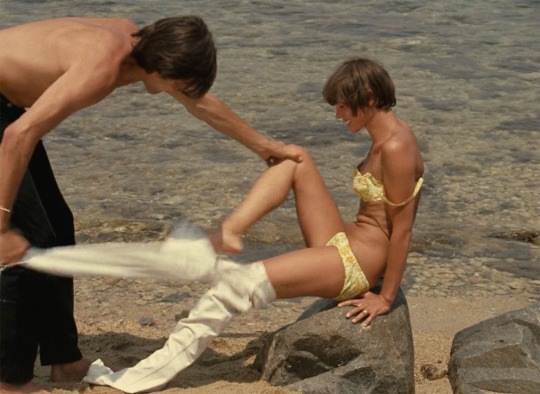
Adrien and Haidee, La Collectionneuse
For Godard, the most important of his films to have a male child protagonist is Masculin-Feminin - the main character, Paul the, is so preoccupied with himself and his surveys that he doesn't notice his girlfriend is having a lesbian affair. At the end of the film, Godard punishes his ''ignorance'' by having the girls push him out of a window.
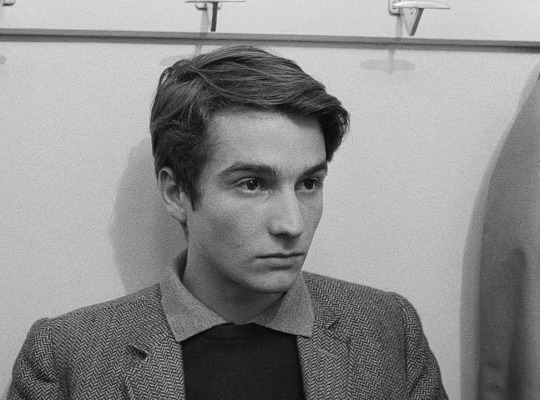
Paul, Masculin Feminin
Although these man-child characters are at times insufferable, they are such fun to watch, and their ego's are silenced in the New Wave movies. It is a great trope to deal with the issue of modernity and so-called sexual freedom, which is still not so free for women, and the clash between the social-emotional capacity of a male and the modern woman's.
#la maman et la putain#masculin feminin#la collectionneuse#eric rohmer#jean luc godard#francois truffaut
7 notes
·
View notes
Text
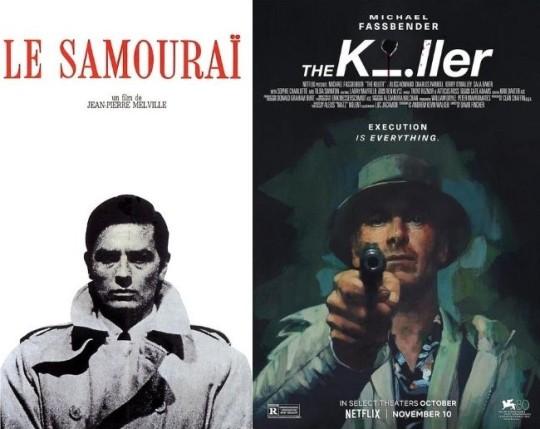
The Killer (2023) vs Le Samourai (1967) and Adorno's The Culture Industry
26.03.24 - Blog Post 6
In a recent interview, Michael Fassbender, who plays the main character in David Fincher's latest film, The Killer (2023) talked about the costume choice for his character: He said they chose the killer's outfits from clothes that can be bought from every airport in every country. He even joked about how Fincher wanted him to look like a German tourist, so they went for a regular European tourist look. A couple minutes later, he mentioned about how Fincher was inspired by Le Samourai, Jean-Pierre Melville's legendary film, starring Alain Delon. Fassbender said, "Fincher wanted him as sharp as Jeff Castello, his moves and his tidiness should be cool as Jeff.'' This was an unfortunate thing to say, in my opinion. The Killer was a flop, it was the worst film in Fincher's career. When you watch The Killer and Le Samourai back-to-back, things get even worse for The Killer. Fassbender is not wrong tho, it is obvious that how Fincher was inspired by Melville and tried to create the same props and styles as Le Samourai's. It is easy to spot the similarities between the two films, both of them are about a cold-blooded hitman, which lives a very lonely and tidy life. The plots are also similar, the routine of these men gets interrupted because of a mistake they made- Castello was seen by a woman on the crime scene, and The Killer, let's call him K, missed the shot. The physical appearance of the actors who played the hitmen are strikingly similar, even the gaze, which is cold as ice, thanks to the big blue eyes of the actors. So, why is Le Samourai still an unforgettable masterpiece, while David Fincher's The Killer is such a pointless and bad movie?
First, let's look at why Le Samourai is not an ordinary hitman-thriller, but an emotional movie that speaks to the soul. Jeff, our protagonist, speaks so rarely in the movie that the director is always telling us something through Jeff's interactions with the people around him (mostly his lack of communication) and the decor of his house. This is one of the most important choices that makes the movie memorable - the director shows us that Jeff is unhappy with his lifestyle, but he can't do anything to change it, yet he is too accepting and mature to whine about it. The people in Jeff's world are inhuman, they are either indifferent to crime or they are the ones who commit it. Jeff has also lost his humanity in this order - he keeps a bird in his house, and the bird keeps fluttering and trying to get out of its cage. Jeff doesn't let the bird out, and he himself can't get out of his order. As a result of what happens to him (a woman sees him in the place where he committed the murder), Jeff runs away. Finally, he is able to break free from his wheel by sacrificing himself. Melville never exaggerates, the streets of Paris, which normally look like something out of a painting in a 60s movie, are shown as dirty and dangerous, and the houses are falling into disrepair. Dialog is sparse and used only where necessary. Violence is almost non-existent.
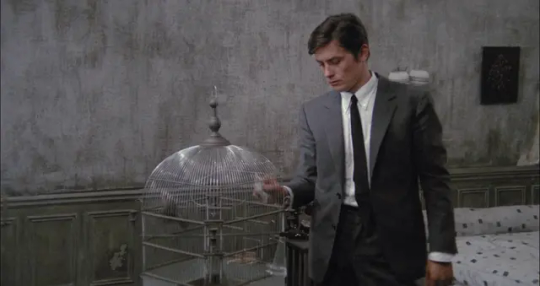
Fincher's K, on the other hand, starts talking non-stop from the very first scene of the movie; he tells us a lot of useless things about his work ethics and his routine, and the funny thing is that K's life, which is supposed to be "interesting", does not make the audience curious at all. We hear what our character, who doesn't have a very interesting personality anyway, is thinking and doing and we continue to watch the same thing on the screen. This fools the audience and gets quite boring. In addition, K's constant change of countries, luxurious locations, expensive gadgets and fancy weapons are thrown at us in every scene, and Fincher, who does not give us even a second to wonder where and on whom those weapons and gadgets will be used, reduces the element of curiosity in the movie to the finale: Will K be able to reach the people who attacked his wife? K, as an American, opens all doors, gets everything done with money and violence, and at the end of the movie he returns to his luxurious villa in a tropical climate to be with his wife, whom he left all alone during the hospitalization.
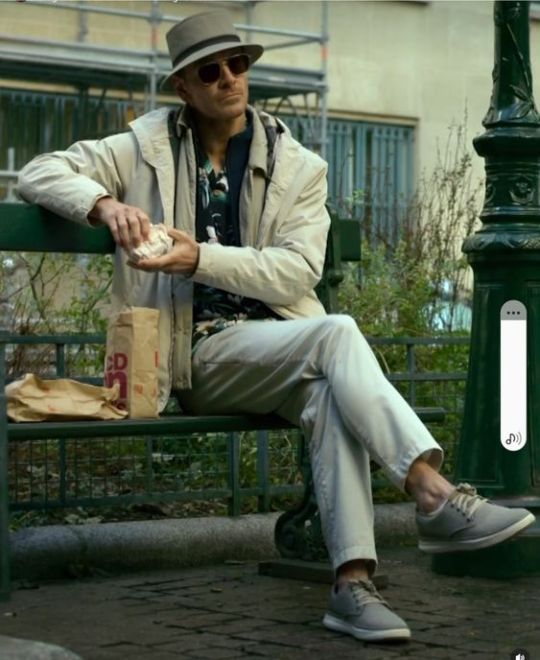
The Killer doesn't even manage to be a badly Americanised copy of Le Samourai. Sure, there are a lot of things that have been Americanised, because everything in our lives is now of the same standard. In Adorno's theory, the culture industry, there was talk about films and how they had caught up with Hollywood clichés and so on. I think Le Samourai and The Killer are the best examples of this cultural change. As the world gets smaller and smaller, so do the emotions and our reactions to them. Like K, every aspect of the film's story and the character's psyche should be very obvious to us, the stupid audience, and we need violence and fancy effects to keep our attention on the film. It is almost hard to watch how a character that has to be written to be taken seriously by the audience (because this film is not a mockery) is an American man who dresses like a tourist and eats hamburgers in Paris. I really did consider the small possibility that this film could be a mockery of the 'hitman' or 'killer' trope, but as a teacher of mine said, 'you should set the mockery to mock something' - so unfortunately Fincher saw his character as his version of Jeff Castello, who is a product of the culture industry. A man loves money, even though he lives inhumanely because of it; shows no remorse, always finds his way, and indifferent from every other successful American in today's capitalist world- Jeff Castello without conscience and dollars. Everywhere he goes, even when he changes continents, is always the same, the food, the living styles, the money- the world of American movies gets smaller and smaller each day just like our world. What a shame!
5 notes
·
View notes
Text
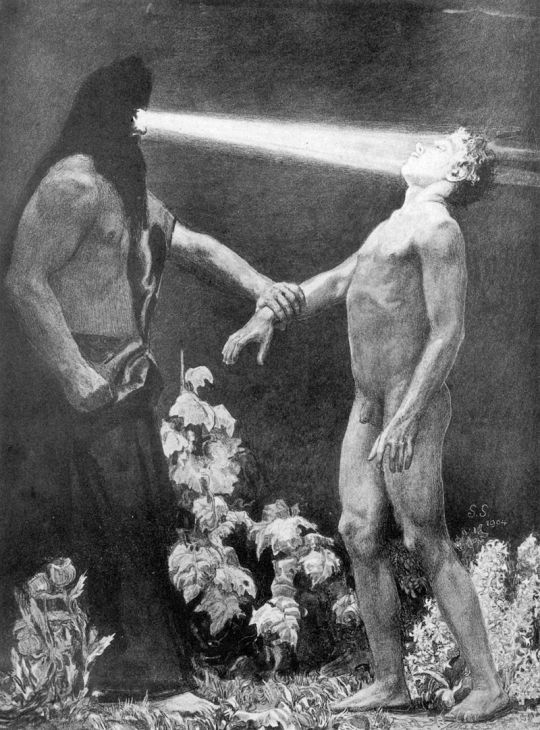
Sascha Schneider, Hypnosis, 1904
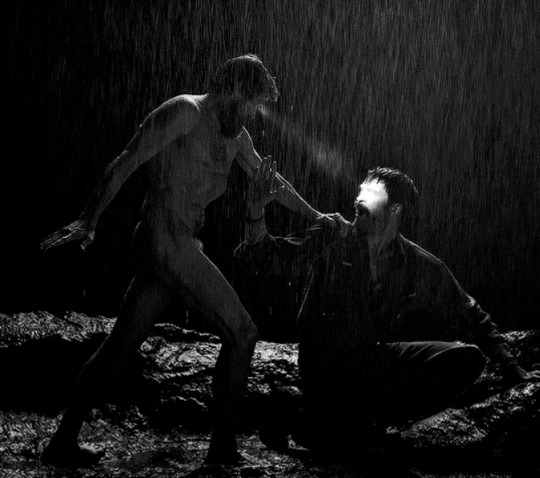
The Lighthouse (2019) dir. Robert Eggers
Blog Post 5 - Why the scene from The Lighthouse is a tableau vivant? - 21.03.24
Inspired by a painting by Sascha Schneider, the film tells the story of two men's struggle for power over each other without any counterbalancing element, through mythological references. Sascha's paintings as he says often about the sexuality and domination ower males, with the touch of mythological elements.
Plot of the Movie
Thomas, an experienced sailor, and Ephraim, a rookie, arrive on an island. There is nothing but a hut and a lighthouse on the island where they will stay for a few months. Ephraim, who follows Thomas' orders and runs errands, begins to believe that there is something hidden in the lighthouse, which Thomas takes care of religiously. The lighthouse, which Thomas refers to as "a beauty" and which he keeps away from other men, is a phallic symbol. In this context, the movie can be read both sexually and in terms of myths. The character of Thomas, who keeps Ephraim away from the lighthouse just as he keeps his woman away from other men, constantly crushes the young man and destroys his psyche. When Ephraim's fragile ego is shattered, there is a breaking point in the movie and the young one rebels against the old one: he starts chasing the forbidden and we don't know what he ends up with - he ends up being devoured by "seagulls" like Prometheus.
Hypnosis and the Scene in the Film
When you think about it like this, you realize that this is more about the struggle of "men" against "He", that is, a man against God, rather than a power struggle between two men. The price paid by human beings trying to reach knowledge or a rebellion against authority. From this point of view, when Thomas rebels against the "old man" and starts to run away, we come across the scene I have put the image of. We see how vulnerable the kneeling "man" (Thomas) is in front of "God" (Ephraim) and how he is under the influence. Thanks to his position, Thomas dominates Ephraim. Mise-en-scene-wise, the director has created a dark, black and white atmosphere just like in the original painting. Although the director wanted to film Pattinson (the actor who plays Ephraim) with his penis visible, the director, unable to escape the pressure of the producers, chose to show the vulnerability of the young man kneeling on the ground, not in nudity as in the painting. The scene is generally dark, with the only strong light coming from above, illuminating the actors from above, almost filling the entire frame. Low key lightning is used. The shot type is long shot, the framing is symmetrical.
14 notes
·
View notes
Text
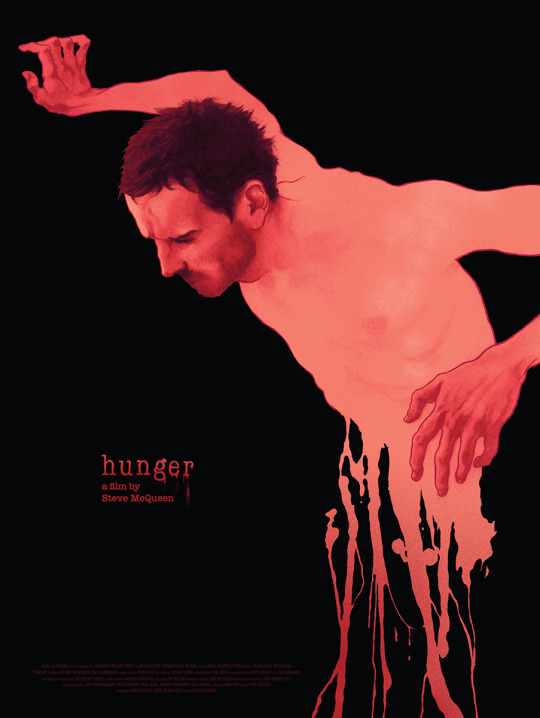
Blog Post #4 - Hunger (2008) Review
Hunger (2008) is a movie about an IRA militan, Bobby Sands and his days in prision as a political prisoner. In the prision he stays, other prisoners have been practicing un-washing and blanket protests for years. When Bobby realizes that their resistance is not enough to convince the British, he goes on hunger strike. He dies at the 66th day of the hunger strike, while he was selected as a parlament member of IRA.
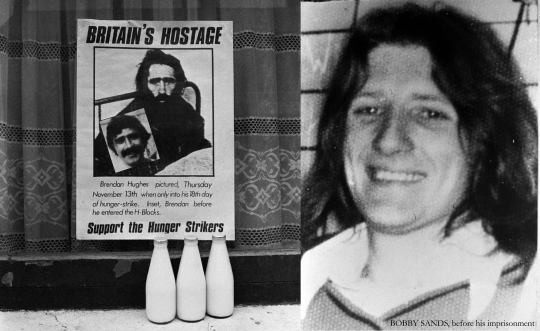
Hunger is a terrifying movie. It is true that Shame is an impressive film, but when I went back to watch the director's first feature, I thought that Shame made for a rather "easy" viewing experience. Hunger shocks you with its physical violence and bodily activities, which we usually see polished in cinema, starting in the first fifteen minutes. When the camera enters one of the cells, I couldn't believe my eyes, it was so hard to watch the traces of feces on the walls, the scraps of food piled up in a corner that wouldn't even be given to a dog, the miserable state of the political prisoners. Hunger is the story of men trying to resist with the only thing they have, their bodies, in an environment where there is no humanity - they are trying to get their rights with their urine, their feces, their skin, their vomit. The dialog between Fassbender's character and the man who comes to persuade him, a priest; the policeman who can't stand it and sobs on the sidelines while his colleagues beat the prisoners; Bobby's touching his ribs, which are now sharp as corners and seem as if they will break through his skin; the vulnerability of the people, and the camera's unflinching images as if it were a ghost walking around, Hunger is a very difficult film. I was very impressed by the director's success in portraying the "human condition" objectively in every aspect. Let me end this article with a sentence I saw in a review: "Beware, the facts you see in this movie may spoil your eyesight!
6 notes
·
View notes
Text
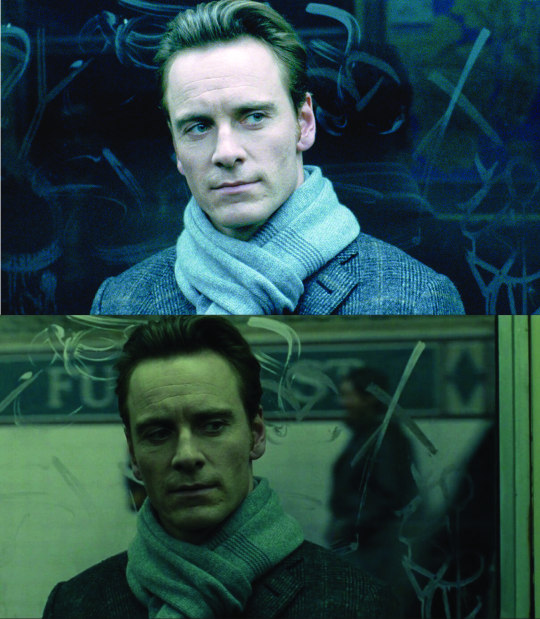
Blog Post 3 - 5/03/24
Shame (2011) - Revisited
I remember seeing the poster for McQueen's movie when I was flipping through my father's newspaper and I was impressed by the title. I was eleven. I had the opportunity to see Shame when I was probably fourteen or fifteen, and at the time I felt like I was watching a man, which I had no idea what was wrong with him, going from place to place in a cold city, and I didn't like the movie at all. But still, I never forgot the movie, I even wrote a few things about it. Years ago, I approached the movie not from the point of sex addiction but from the point of miscommunication, maybe because the movie couldn't communicate with me, an viewer, at that moment. Three years ago on my movie page I wrote the following:
"Although it looks like a movie about addiction, the point of this uncommunicative movie is "miscommunication." Miscommunication between Sissy and Brandon, between Brandon and his date, between Sissy and the person on the phone. Even Brandon's miscommunication with himself."
It's true that Brandon has communication problems, especially with his sister, and with almost everyone he comes into contact with, but it's absolutely wrong that the movie is the story of a man with "no clear problem". It's the epitome of how some movies should be watched when you reach a certain age, and this time, I was very impressed by the movie. I could talk about the cinematography, the sequence in the last half hour, the great acting all night long. But let me just talk about the parallelism that sticks in my mind the most: In the opening scene, Brandon, with his light colored blue scarf, is very self-satisfied, self-confident and his senses are constantly open to other women, while in the last scene of the film, yellowed colors are used. Every color is saturated, as if he is mourning the addictive personality and life he left behind, and when he sees the woman he ran after in the first scene to be with, a whole range of contrasting emotions cross his face: Regret, disgust, desire, sadness, perhaps contempt. Like quitting smoking, Brandon becomes a person who is always vulnerable to temptation, who mourns his old pleasures, who needs to be on guard at all times, but who has learned his lesson. Or has he? We don't know if Brandon goes after the woman in the movie, but I want to think that he doesn't. I want to imagine Brandon as a character who can communicate with people in a healthy way, who can make peace with the ghosts of his past.
5 notes
·
View notes
Text

The Zone of Interest and The Banality of Evil
28.02.24 / Blog Post 2
I think that Hannah Arendt's The Banality of Evil is still relevant today, with the question at the heart of her work: How can a person do evil things without being evil? She described those who did terrible things as often banal, very ordinary, and "frighteningly normal". Nearly a century later, we still seem to be amazed and shocked at how the Nazis and almost the entire German nation, which kept its mouth shut to the ongoing horrors, could do such horrible things to millions of innocent people. We still can't seem to wrap our heads around it. That's why there are so many movies about the genocide, and The Zone of Interest is the latest one. It stands on a different ground than other genocide films. Rather than making Nazis stylish and powerful bad guys, it shows a frighteningly normal German family, with basic dreams that we can all have, living a very tidy and organized life.
The movie is about the unremarkable personalities, simple ambitions and small pleasures of Colonel Höss and his wife Hedwig, who live in a house like something out of a dream, right next to the Autscwitz camp where millions of people died. As we watch the family eating dinner, the couple's children playing games, and the wife and husband giggling at a silly joke, on the other side of the wall they have built, we can hear the guards shouting, and the gunshots. Sometimes a character opens the curtains and we see huge chimneys with the smoke of burned people coming out of them.
We see how the horrible crimes committed by the Nazis are normalized and ignored in the life of a normal and ordinary family. We see how being evil can be taken for granted and that the people we ask "how could they do this?" are not monsters, but ordinary people with ambitions and emotions like us.
The movie thus becomes one of the most horrific genocide movies one has ever seen, without showing a single moment of death or torture: Because it reminds us of how normal people who are so ordinary that we don't even notice them can turn into monsters if given the chance and how they can justify their actions, I left the movie with an unexplainable stomach ache rather than a guilty conscience, just like Höss retching for no reason at the end of the movie.
2 notes
·
View notes
Text

Block Post 1
Poor Things (2023) Review
I had the chance to see arguably the best film of 2023 in the cinema yesterday. The film is so comprehensive and unique that there is so much to say. First of all, there are a few things I can't stop mentioning: Poor Things is a great movie, but it has its share of the Woke culture that has spread like a cancerous cell from America to the rest of the world, and of pedophilia that is diametrically opposed to what it pretends to stand for. I don't know if my brain was too clouded by feminist cinema readings this year, but I'm tired of films with the themes of "a woman's liberating story" or "a free woman exploring her sexuality in a male-dominated world" being underlyingly threatening, hypocritical and insincere. Unfortunately, this movie does the same thing by not holding back from showcasing Emma Stone, a hairless, Barbie doll-like Emma Stone from every angle, at every opportunity, and by never separating the story of women from the story of men. The question I usually think about when I watch these movies came to the center of my mind again: Is there any way to tell a woman's story without putting her on display?
Since this discussion will go on and on, let me talk about the aspects of the movie that everyone can agree on: The dreamy set design that makes you feel as if the characters have fallen into a candy store, the excellence of the music and sound design, Emma Stone's raw acting, the fairytale-like editing, and the sex scenes and male-female relationships that take you from one emotion to the next: shocked-shamed-impressed-disgusted. Poor Things is a bizarre Frankenstein story, an absurd fairy tale, a provocative thriller, and a visual feast for the eyes. What attracted me the most were the elements of body horror and humor, especially in the first half - it was also nice to see Mark Ruffolo as the obsessed lover. Poor Things should definitely be seen in the theater, even if you don't like it, it offers you the chance to have an experience you will never forget.
0 notes